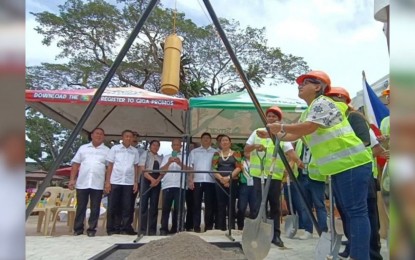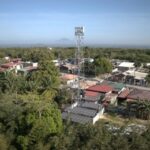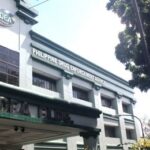MANILA – With just days before President Ferdinand Marcos Jr. delivers his State of the Nation Address (SONA), the government’s continuing rollout of Super Health Centers (SHCs) has become a key highlight in the administration’s health agenda.
According to the Department of Health (DOH), over 600 SHCs have already been funded and constructed nationwide since the program began in 2022.
These centers are designed to bring essential medical services closer to communities, especially in far-flung and underserved areas.
The DOH stated that SHCs are part of the government’s long-term strategy under Republic Act 11223 or the Universal Health Care (UHC) Law, aimed at decongesting hospitals and providing quality and accessible healthcare at the community level.
Introduced in 2021, SHCs serve as an enhanced version of rural health units, equipped with basic to intermediate health services such as laboratory testing, X-ray, ultrasound, electrocardiogram, outpatient consultations, maternal and child services, tuberculosis screening, minor surgeries, and ambulatory surgery.
They also function as satellite vaccination sites, pharmacy dispensaries, and referral systems for more specialized care.
In 2022, about 307 SHCs were established nationwide, followed by 322 in 2023 and 132 in 2024. The DOH identifies strategic locations for these centers, as they serve as a crucial support layer between barangay-level health units and hospitals.
This year, additional SHCs were opened in Pangasinan, Eastern Visayas, and Zamboanga City, alongside existing facilities in Aklan, Agusan del Sur, Bulacan, Cebu City, Dinagat Islands, Leyte, and Northern Samar, among others.
On Feb. 27, a groundbreaking ceremony was held for a PHP187-million super healthcare facility in Barangay Iluluan, Camalig, Albay.
Another PHP12-million SHC under the DOH Health Facility Enhancement Program had its groundbreaking ceremony in Matag-ob, Leyte, on Feb. 28.
On March 24, a PHP50-million SHC in Sampaloc held its groundbreaking ceremony.
SHCs are a key initiative under the UHC Law and Republic Act 11959, or the Regional Specialty Centers Act, emphasizing preventive care and early disease detection.
The expansion of SHCs helps reduce hospital overcrowding and financial burdens on patients from travel, while strengthening the country’s primary healthcare network.
Local government units collaborate with the DOH for construction and operations, with funding managed by the Department of Public Works and Highways (DPWH).
The Marcos administration plans to complete hundreds more SHCs in the coming years, with upgrades including expanded diagnostics, mental health support, and digital health integration.
As the country recovers from the long-term effects of the COVID-19 pandemic, SHCs are expected to play a vital role in building a more resilient, inclusive, and community-based health system.
Super Health Center
A **Super Health Center (SHC)** is an enhanced healthcare facility in the Philippines designed to provide primary care, diagnostics, and basic specialized services to local communities. Established under the government’s healthcare modernization program, these centers aim to bridge gaps in medical access, particularly in rural areas, by offering services such as outpatient care, birthing facilities, and telemedicine. The initiative reflects efforts to strengthen universal healthcare and reduce hospital overcrowding by decentralizing health services.
Department of Health (DOH)
The **Department of Health (DOH)** is a government agency responsible for public health policies, healthcare services, and disease prevention in many countries, including the Philippines and the United States. Established to oversee national health standards, the DOH plays a key role in managing health crises, implementing health programs, and ensuring access to medical care. Its history often dates back to the late 19th or early 20th century, evolving to address modern health challenges such as pandemics and universal healthcare.
Matag-ob
Matag-ob is a municipality located in the province of Leyte, Philippines. It was officially established as a town in 1948 and is known for its agricultural economy, primarily producing rice, coconut, and abaca. The area also features natural attractions like waterfalls and caves, reflecting its rural and scenic charm.
Leyte
Leyte is a province in the Eastern Visayas region of the Philippines, known for its rich history and pivotal role in World War II. It was the site of the historic **Leyte Landing** in 1944, where General Douglas MacArthur fulfilled his promise to return and liberate the Philippines from Japanese occupation. Today, Leyte is also celebrated for its natural beauty, including the San Juanico Bridge—the longest bridge in the Philippines—and its vibrant cultural festivals like the *Sangyaw* and *Pintados-Kasadyaan*.
Eastern Samar
Eastern Samar is a province in the Philippines located in the eastern part of the island of Samar, known for its rugged coastline, natural beauty, and significant role in history. It was one of the first landing sites of Ferdinand Magellan in 1521, marking the beginning of Spanish colonization. Today, it is recognized for its pristine beaches, lush landscapes, and cultural heritage tied to indigenous Waray traditions.
Universal Health Care (UHC) Law
The **Universal Health Care (UHC) Law**, enacted in the Philippines in 2019 (Republic Act No. 11223), ensures all Filipino citizens equitable access to affordable and quality healthcare services without financial hardship. It expands the coverage of the national health insurance program (PhilHealth) and emphasizes primary care, preventive health, and financial risk protection. The law reflects the country’s commitment to achieving sustainable healthcare for all, aligning with the World Health Organization’s global UHC goals.
Republic Act 11223
Republic Act 11223, also known as the **Universal Health Care Act**, is a landmark Philippine law signed in 2019 to provide all Filipino citizens with access to comprehensive healthcare services. The law ensures automatic enrollment in the national health insurance program (PhilHealth) and aims to reduce out-of-pocket medical expenses, prioritizing preventive care and financial risk protection. It reflects the government’s commitment to achieving equitable healthcare as a fundamental right for all Filipinos.
Republic Act 11959
Republic Act 11959, also known as the **”Regional Specialty Centers Act,”** was signed into law in 2023 by Philippine President Ferdinand Marcos Jr. The law mandates the establishment of specialized medical centers in regions across the Philippines to improve access to specialized healthcare services, reducing the need for patients to travel to Manila. It aims to decentralize advanced medical care and enhance the country’s public health infrastructure.






